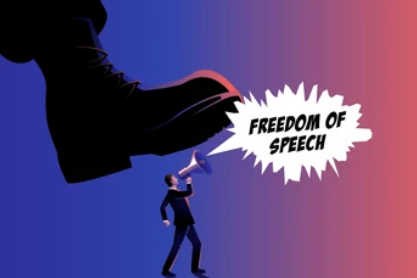A cross-section of South Sudanese has complained about the lack of freedom of expression, which they say limits their participation in the country’s affairs.
They contend their freedom of speech and expression is severely restricted and has deteriorated since independence, with authorities, particularly the National Security Service (NSS), systematically curtailing these rights. While the transitional constitution provides for freedom of expression, it is not respected in practice.
They say overall, the situation in South Sudan is characterized by a “shrinking civic space” and systemic repression, which human rights experts warn is hindering the implementation of the peace agreement and threatening the potential for lasting peace and democracy.
“It is very difficult to express oneself; it is really a challenge, some people are seen like they do not have a use, and people are not given a chance to express themselves on what is happening because of security,” Okech Santo, a Juba resident, told Radio Tamazuj’s Road to Democracy Program. “If you speak about something, the people in power can get rid of you.”
He added, “My appeal to the people in power is to consider everyone equal.”
Bear Gladys, a resident of Torit Town in Eastern Equatoria State, said if citizens were free to express themselves, some decisions would be made collectively to help the country.
“In South Sudan, if you want to tell the truth as a citizen, it is not that easy because people fear that they will be arrested, yet we are supposed to speak without fear for a better country,” she stated.
For his part, Michael Lokang of Kapoeta echoed that people fear speaking due to fear of being apprehended.
“These days, people fear speaking the truth because they will come and arrest you. If there were freedom for all to speak their minds, it would be good. We need freedom, peace, and equality in this country,” he said. “No one should be looking at tribes, people should speak what is in their hearts, people should not be intimidated for the truth they speak. It is not good. If people are given freedom to speak the truth, it will help this country.”
Lokang urged political leaders to ensure that citizens enjoy their right to free expression so that the country moves forward.
“Without peace there is no freedom, and we want our politicians to bring peace,” he added: “We do not want our people to run to Kenya or Uganda, they are suffering there because there is no peace in South Sudan.”
Meanwhile, Lokanga Augustine Koito, a civil society activist who doubles as the executive director of the Community Action for Development Organization (CADO), resonated that there is no freedom of expression despite it being enshrined in the constitution.
“There is no freedom of speech because citizens fear correcting the government because of intimidation. People fear that if they speak, they will be questioned,” he said. “The state of freedom of expression is not the way we want it because this country is not stable, and there is always intimidation of citizens, and they fear they will be arrested for speaking about the wrong things going on in the country.”
According to Lokanga, the people in government do not implement the laws because they fear that people will point out their mistakes.
The activist urged the government to emulate neighboring Kenya and other countries where citizens can air their grievances freely so that they are addressed. He believes that if there is democracy in South Sudan, conflicts will end.




